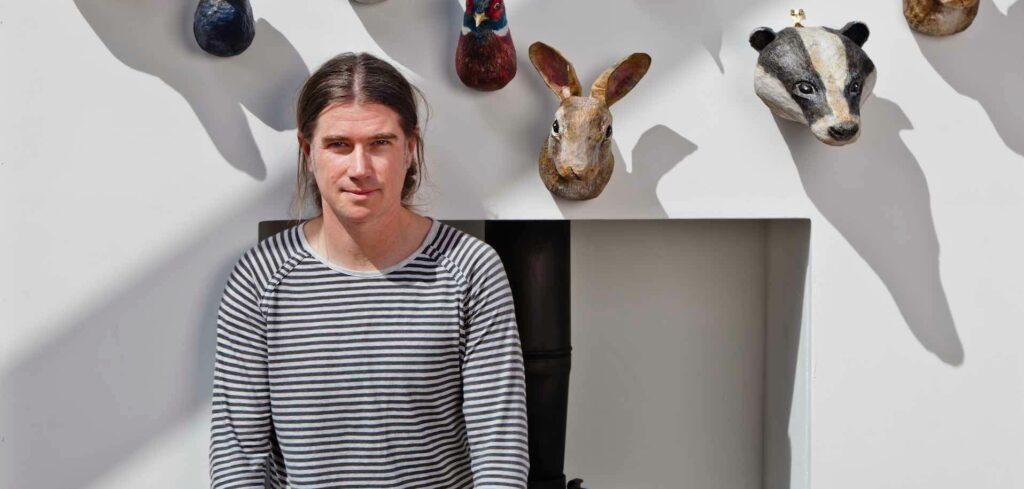
From journalism to production, DJing to A&Ring and promoting, Rob Da Bank’s multifarious career in music has marked him out as a modern day polymath. Best known these days for his annual Bestival event (and the family-friendly spin-off, Camp Bestival), he continues to host regular shows on BBC 6 Music and recently launched a new electronic label, Silver Bear Recordings. He’s also the co-founder of the London Electronic Arts Festival, which returned for its second edition last month.
With the first international edition of Bestival announced – taking place in Toronto in June – we grabbed some time from his hectic schedule to find out more about the inner workings of his acclaimed parties.
Talk us through the process of putting together the line-up for Bestival. Where do you start and do others help you curate?
I’m quite selfish when it comes to curating the actual musical line-up. My wife Josie does the whole creative side of it, and then there’s a girl, Becky, who does the arts and poetry, spoken word and so on. Then everything else I kind of do myself. Other people give me ideas and I obviously listen to people on social media – Bestival fans that get in touch. We actually keep a little running tally of people that request bands – so someone looks on social media each week or month and goes, OK, there’s been 15 requests for Major Lazer and 25 for Rage Against The Machine and 3,000 for Prince, or whatever. So I really listen to that as well. But at the end of the day, it comes down to me making the final decisions for better or for worse.
The event went through a production ‘rebrand’ last year in terms of new stages / areas with much higher production value, was this a reaction to having to compete with high-production events like Boomtown Fair and Tomorrowland?
The Port was obviously our biggest build to date, but in the years before that we had The Swamp Shack and lots of other creative builds. It wasn’t a conscious thing influenced by other festivals necessarily, it was just that we wanted to make a statement ourselves with a big build. Ideally, if we had the money we’d do loads more of that sort of stuff, but I think we split the money. Some festivals, like Tomorrowland or Boomtown, a lot of their budget obviously goes into that, and it looks fantastic. I think we have to be careful that we don’t kind of go – ‘let’s build loads of amazing structures’ – because then we’d have no money left for acts. So I think it’s just a juggling act between – do people want to see a lot of acts, or big acts, and do they want a couple of big cool structures, or do they want more structures. It changes all the time. But I think we’ve got a good balance at the moment.
You guys seem to have an amazing relationship with the local authorities. How have you achieved this and would you continue if you didn’t?
The authorities have always been super-cool with us, and we’ve always really toed the line. We’ve never done anything naughty. We’ve always played by the rules, and I think that’s vital. It’s the fundamental thing of running a festival: if you haven’t got the support of the council, the police and so on, it’s just going to be an uphill struggle. Luckily our producers, Loud Sound, who have produced us since the beginning, have got a lot of experience with that. And they’ve always done Creamfields – so I think if you’ve managed to produce Creamfields, at that sort of level, you can probably do Bestival. When things do go wrong – a bad weather thing, or if traffic goes awry – having their support makes it a lot easier.
Sound at festivals can be of hugely varying quality. How do you guys decide which systems to use where? What needs to be taken into consideration?
I think we had a few years where we hadn’t quite nailed it. I wouldn’t say we’ve always had the most amazing sound – but I think the last four or five years, we have. I think our main stage system people particularly remark on. All the systems now. All the sponsors who come in, like Red Bull, know that it has to be high-level. And I think that most festival now know that people just won’t listen to a shoddy system. So it’s just sort of tweaking.
We try and stick with suppliers, because it’s good to have a base of suppliers that you work with all the time – but we’re always trying out new things. The guys who run Flare who did our LEAF festival, they’ve got a very impressive soundsystem. So I’m always on the lookout for new stuff. If we know it’s a DJ-only system, we’ll rig it for that purpose. The guys look at what we’re programming. If it’s an acoustic stage, it doesn’t need so much welly… and so on.
With Bestival having grown to such a big capacity, does putting on the more intimate Camp Bestival feel less of a stressful affair?
Yes! Definitely. It’s a lot of work still, but the actual weekend is a lot less stressful – and we did create it with that in mind. It’s lovely to be able to spend probably 70% of the festival with my family and the kids and friends, and 30% of it working – whereas at Bestival, it’s 99% working and I see my kids for about an hour on the Sunday afternoon, and then I get called off to do something else. I almost prefer it to Bestival in a sad way, because it means I can actually enjoy it! I love Bestival to pieces, and I get so much enjoyment out of it – but the actual festival itself from Thursday to Sunday is pretty much non-stop.
I think people who haven’t been look at a festival of 10,000 under-16s and 10,000 adults and think – how can that be relaxing? It isn’t necessarily relaxing, but I think because there’s so many kids, everyone’s really fired up for that experience. Then apart from the lost children department, everyone has quite a good time!
After 11 years, you must have the process of staging a festival down to a fine art. Are there still things that catch you by surprise or that you can’t plan for though? Weather aside…
Definitely. There’s no year the same. I remember getting through the first year and thinking – right, it will be easy from hereon in. Every year there’s different challenges, whether it’s in the run up to it with selling tickets, competition, whether it’s the actual weekend, the weather, people enjoying themselves too much, soundsystems going down, power cuts…. fortunately we’ve only had one or two serious things in that time, so I think we get off pretty lightly. But you’ve always got to be on your guard.
I think the main thing at the moment is just the level of competition is high – which is great, because I relish that. You’ve just got to be on your best foot forward the whole time really.
You recently announced your first non-UK event in Toronto, Canada. Why did you feel that the time / climate was right to make this move?
We dilly and dallied around for years – and loads of people had given us great offers – but we’d never thought it was quite the right thing. So until we teamed up with SFX in North America and they found us this cool site in Toronto, it just didn’t feel right. But as soon as we saw it and they said “hey, there’s an island you can do a festival in Canada” – we were like, OK, we like doing festivals on islands, let’s have a look. And we just fell in love with it. It’s gone down really well over there so far. It’s daunting doing a festival thousands of miles away and not being there until the week before to oversee it, but we’ve got good partners there, and the people of Toronto seem to be behind it. So yeah, fingers crossed.
What are the logistical implications of planning a festival overseas?
I’ve been working with the guys from Embrace, who are our partners over there, on the talent – so that’s different for me, because I have to share that, which I’m not used to but I’m enjoying. They know the local market, they know what Canadians want to hear, so that’s good. Josie’s been over there a few times doing site visits. She’s built a whole new structure called The Temple – which is kind of like The Port – so that’s going to be out there on the beach on Toronto Island. So she’s been really busy with building that. We’ve got a couple of containers going out this month for that. Then we’ve got a big time on the ground that’s pulling it all together.
What new technology will you be implementing at this years event, from both a festival-goer and backstage / production / marketing perspective?
It’s not like we’re going down the RFID route all of a sudden or anything like that. We’re as cautious as everyone else seems to be on this front. I do think we’re all being a little bit chicken and one of us should put our best foot forward and embrace it, but everyone seems nervous about the technology. I think Europe and America are ahead of us on that. We could definitely more of that stuff at Bestival. At the same time, I kind of like the spit and sawdust approach. We could have our bars and everything totally computerised, but I think once you’ve gone down that kind of way, it’s a bit dehumanising.
How was the second edition of LEAF?
It was fantastic. We’re back for good now. We took a year off after the first one, because it was quite a learning process, and we came back strongly. We had 5,000 people on the Saturday and about 1,000 people there for the conference on Friday. Some amazing performances and talks and stuff from Nile Rodgers and DJ Harvey, the Black Butter guys and Ninja Tune. It was great to see a vibrant, mixed crowd. It wasn’t one of these conferences with lots of bearded, bespectacled 40-year-old blokes, my age, taking notes. It was really young and mixed and it was really refreshing. And Tobacco Dock’s an incredible venue to do it in, so I think a lot of people were wowed by that. And the sun was out. I’m really anti urban festivals, but that one kind of worked.
Finally what was the decision that led to booking Snap! at Bestival?
We had them about three years ago, and they were so good – obviously down to a couple of records really. But if I had the budget, I’d be booking so much more random stuff. Every year I vow to go really mad and just book loads of stuff from all over the place. But I think it’s one of those things where even if it only appeals to 200 people on site and the sun’s out, it will be a good one for everyone.

